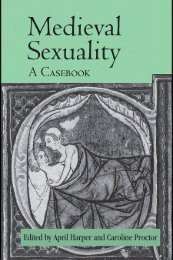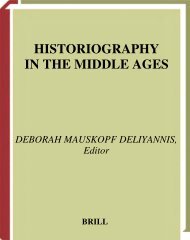Festive Satire: Julian's Misopogon and the New ... - Julian Emperor
Festive Satire: Julian's Misopogon and the New ... - Julian Emperor
Festive Satire: Julian's Misopogon and the New ... - Julian Emperor
You also want an ePaper? Increase the reach of your titles
YUMPU automatically turns print PDFs into web optimized ePapers that Google loves.
tempted to ab<strong>and</strong>on all quests for <strong>the</strong> social context of <strong>the</strong> <strong>Misopogon</strong> <strong>and</strong> to regard it as apsychiatric or rhetorical exercise.Did contemporaries think <strong>the</strong> <strong>Misopogon</strong> odd? Ammianus thought its criticismsharsher than <strong>the</strong> situation warranted,', but did not castigate <strong>the</strong> emperor for doing anythingundignified-as he did not hesitate to do on o<strong>the</strong>r occasion^.^^ After <strong><strong>Julian</strong>'s</strong> deathLibanius praised him for resorting not to <strong>the</strong> punishments of <strong>the</strong> despot but to those of <strong>the</strong>orator.Ir In his correspondence with <strong>the</strong> emperor, Libanius never mentions <strong>the</strong> hlisopogonexplicitly, although in his sixteenth oration he tries to refute its arguments point bypoint.lZ We are not entitled to conclude, however, that Libanius passes over <strong>the</strong> incidentin silence because he felt it embarrassed <strong>Julian</strong> ra<strong>the</strong>r than Antioch. Zosimus transmits <strong>the</strong>opinion (undoubtedly from Eunapius) that it was a most elegant speech (A6yov&~TEIOT~TOV).'~ Socrates <strong>and</strong> Sozomen both report favourable judgements on <strong>the</strong><strong>Misopogon</strong>. As ecclesiastical apologists <strong>the</strong>y knew how to appreciate invective. The formerclaims that <strong>the</strong> satire left 'an indelible stigma on <strong>the</strong> city <strong>and</strong> its inhabit ants'.^+ The lattercomments, 'he suppressed his feelings of indignation <strong>and</strong> repaid <strong>the</strong>ir ridicule by wordsalone; he composed <strong>and</strong> sent to <strong>the</strong>m a most excellent <strong>and</strong> elegant work under <strong>the</strong> title ofBeard hater'.^^ Nei<strong>the</strong>r of <strong>the</strong>se historians makes a practice of sparing <strong>Julian</strong>. Ifcontemporary Antiochenes of any stripe felt (as modern readers do) that in publishing <strong>the</strong><strong>Misopogon</strong> <strong>the</strong> emperor had committed a notorious faux pas, why did <strong><strong>Julian</strong>'s</strong> Christianenemies not even allude to that fact? Gregory of Nazianzus knew <strong>the</strong> :Wisopogon <strong>and</strong> wrotean uninhibited attack on <strong>Julian</strong> soon after he died. But <strong>the</strong> most he can claim is that <strong>the</strong><strong>Misopogon</strong> is nozu an object of ridicule, conceding that this was not so during <strong><strong>Julian</strong>'s</strong> 1ife.1~So <strong>the</strong> hlisopogon seems not to have shocked <strong><strong>Julian</strong>'s</strong> contemporaries as it shocks us.The purpose of this paper is to investigate why it did not, by seeking to define a range of'normal' or traditional behaviour within which <strong>the</strong> actions of both <strong>Julian</strong> <strong>and</strong> <strong>the</strong>Antiochenes can comfortably be contained.It is clear from <strong>the</strong> LVisopogon itself that <strong>the</strong> emperor is replying in prose to scurrilousjibes in verse that have been circulating about him in <strong>the</strong> city (338'4, D; 345D et passim).Things had not been going well between <strong>Julian</strong> <strong>and</strong> Antioch,~': but <strong>the</strong>re must have been alast straw that provoked <strong>the</strong> <strong>Misopogon</strong>. Libanius provides a clue. After <strong>Julian</strong> left <strong>the</strong> cityon 5 March, threatening never to return, Libanius wrote an oration in which he haranguedhis fellow-citizens about what went wrong. He imagines <strong>the</strong>m making excuses for <strong>the</strong> widespreadcirculation of lampoons that exasperated <strong>the</strong> emperor. 'People will say, "We wereafraid that we would be held responsible for abolishing <strong>the</strong> holiday if we forbade what wassanctioned by religious cu~tom.""~ There was a holiday, occurring shortly before <strong>the</strong>9 'probra civitatis i~lfe~lsa mente dinumerans, 'Here is a pillar for you from me, higher <strong>and</strong> more adde~lsque veritati complura' (XXII. 14. z).visible than <strong>the</strong> Pillars of IIeracles .. . which will e.g. XII. 7. 3 (Julia11 jumps up i11 <strong>the</strong> senate to greet inevitably become known everywhere by everyone as it Maximus); XXII. 14. 3 (Julia11 carries sacred emblems in moves about . . . pillorying you <strong>and</strong> your deeds', op. place of <strong>the</strong> priests).cit., ch. 42. See n. 92 below.'7 <strong><strong>Julian</strong>'s</strong> religious <strong>and</strong> eco~lomic policies were <strong>the</strong>l2 He alludes to it indirectly i11 a private letter to major points of frictio11. For a discussion of <strong>the</strong> latter<strong>Julian</strong> (802. z), referring to <strong>the</strong> city's xaxo~pcryia'by see G. Downey, op. cit. (11. 4 above), <strong>and</strong> 'Thewhich I mean not <strong>the</strong> scarcity of foodstuffs, but <strong>the</strong> fact Economic Crisis at Antioch under Julia11 <strong>the</strong> Apostate',that it has been judged wicked, evil, <strong>and</strong> ungracious in P. R. Coleman-Norton, ed., Stzidies in Roman Eco-(6~1TTOV~PUxai KUK~ xai Crxapw~os K~KPIT~I)'. Here nonzic <strong>and</strong> Social Histow in Honor of A. C. Johnson&xapia~o~ recalls €is &xaplcr~aKUT&~LIEVOS fib T ~ S (1951)? 312-21, <strong>and</strong> P. Petit, Libanius et la viexap1-r~~i11 <strong>the</strong> peroration of <strong>the</strong> A14isopogon (371B). munzczpale a Antioch au A' sigcle aprgs J.-C. (1955)~ .-.'3 Histon'a Nowz 111. I I. 109-18.'4 Socr., HE III. 17. Although Socrates was able to Lx Or. XVI. 35. Compare <strong>Misopogon</strong> 355C, wherequote from <strong><strong>Julian</strong>'s</strong> htter to <strong>the</strong> Alex<strong>and</strong>rians (111. 3), Julia11 like Libanius puts words illto <strong>the</strong> citizens'we cannot be certain that he had access to <strong>the</strong> rest of mouths: 'And yet you [Julia111 think that even <strong>the</strong><strong><strong>Julian</strong>'s</strong> works. IIe does, however, give details of <strong>the</strong> charming youths i11 <strong>the</strong> city ought to keep quiet <strong>and</strong>, iflampoons against Julia11, which probably were not to be possible, think what pleases you, but at least say what isfound i11 Eu~lapius' eulogistic account.agreeable for you to hear! But it is <strong>the</strong>ir independence15 Soz., HE v. 19. Sozomen records <strong>the</strong> contents of that makes <strong>the</strong>m hold revelli~lg processions (KOLI~~EIV~,three more of Julia~l's public letters <strong>and</strong> quotes a fourth which <strong>the</strong>y're ge~lerally doing all <strong>the</strong> time, but duringin its entirety (v. 16).<strong>the</strong> festivals <strong>the</strong>y're doing more than usual'. Compare16 '. .. though at <strong>the</strong> time your imperial rank made it also <strong>the</strong> scurrilous young men in Ammianus' excursusimportant' (Cbntra Jzilianum 11. 41, PG 35. 717). The on lawyers who spend <strong>the</strong>ir time composing nzziniambiconclusio~l of this piece shows that Gregory thought of <strong>and</strong> insulting <strong>the</strong>ir betters (xxx. 4. 14-17).himself as posting metaphorically a counter-~<strong>Misopogon</strong>.













